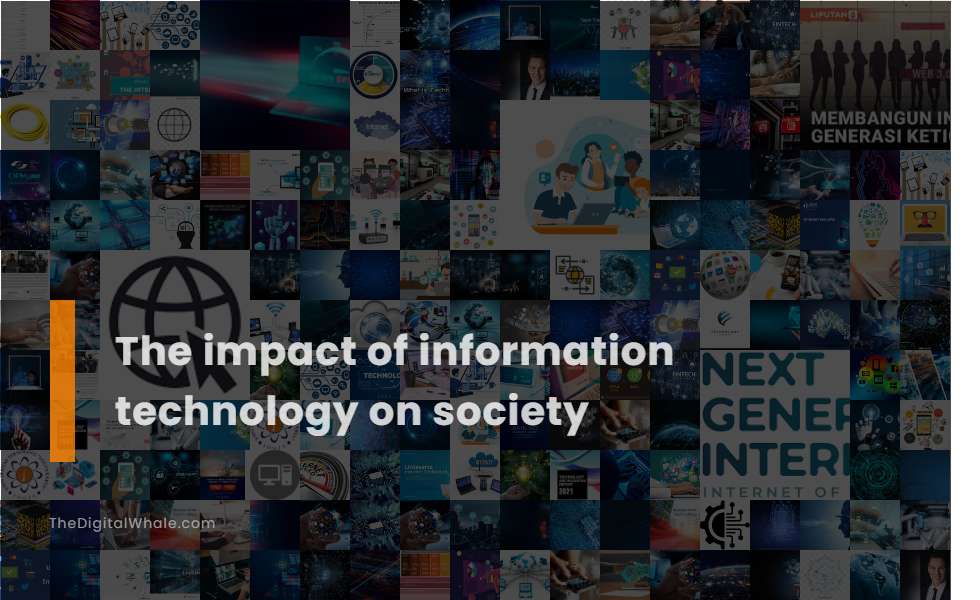The Impact of Information Technology On Society
What is the political impact of information technology on societies? What are some of the benefits of information technology in society? Let's find out more about The Impact of Information Technology On Society.

Improved Communication
Information technology has revolutionized communication, enabling instant interactions through text messages, social media, and video calls, breaking down geographical barriers and fostering global connectivity. This technological advancement has positively impacted social interaction by facilitating virtual connections and overcoming distance-related barriers, making people more connected than ever before. The profound effect on modern society's lifestyle can be explored further through this insightful analysis on Information Technology, which delves into the ways it has reshaped our daily interactions and the fabric of our social connections.
Enhanced Education and Learning
Technology in education enhances learning by providing access to vast resources, promoting personalized and interactive learning experiences, fostering collaboration, and developing essential 21st-century skills such as digital literacy, critical thinking, and problem-solving. The Impact of Technology on Education has allowed students and educators to connect beyond traditional classroom boundaries, leveraging digital tools for enriched educational outcomes.
Mechanized Agriculture
Mechanized agriculture, driven by digital technologies such as AI, drones, robotics, and global navigation satellite systems, has transformed agricultural production by increasing efficiency, precision, and sustainability. This digital revolution has enabled better decision-making and higher yields through automated diagnosis and data-driven practices. For more information, you can explore the comprehensive insights provided by the Digital Revolution in Agricultural Practices which discusses the profound impacts these innovations have on modern farming methods.
Easy Access to Information
Information technology has revolutionized the world of information and knowledge by providing vast and easy access to data, enabling the storage, organization, and manipulation of vast quantities of information, and facilitating global communication and education. Access to technology, particularly the Internet, is crucial for equal access to information and knowledge, as it allows individuals to stay updated with news, educate themselves, and participate in online educational and career opportunities. This highlights the importance of bridging the Digital Divide and knowledge gap.
Increased Unemployment
Technological unemployment arises when advancements in technology and automation lead to the displacement of human workers, resulting in job losses in industries where labor-saving machines and AI take over tasks traditionally performed by people. This phenomenon can be particularly evident in sectors such as manufacturing and administration, where routine operations become automated. However, while these changes may initially displace workers, they can also drive the creation of new job opportunities in other sectors due to heightened productivity and economic growth. As noted by Economics Help, this dual effect underscores the complex relationship between technological progress and employment. With estimates suggesting that automation could replace around 25 million jobs in the near future, it's crucial for economies to adapt by fostering skills and industries that can thrive alongside technological advancements.
Related:
What are the best news aggregation sites for technology users? What are some of the most important ways to stay up to date on technology trends? Let's find out more about How To Keep Up with the Latest Information Technology Trends.
Rise in Pollution
The impact of Information Technology on society encompasses a significant rise in pollution, notably through the energy consumption of data centres, servers, and other IT infrastructure. This consumption contributes to air pollution and climate change, while the improper disposal of tech products leads to land and water pollution. Moreover, the environmental impact of technology extends to the production and use of IT, resulting in substantial environmental pollution. Such pollution includes air and water pollution from the extraction of minerals, metals, and fossil fuels, as well as the generation of electronic waste containing toxic substances like lead, mercury, and arsenic.
Health and Mental Concerns
The impact of information technology on society, particularly in terms of health and mental concerns, is multifaceted. While technology has improved access to mental health resources and services, such as online therapy and support platforms, it also has negative effects, including links to anxiety, depression, and social isolation. Issues like cyberbullying, sleep disturbances, and decreased self-esteem due to excessive social media use are also prevalent. For a deeper exploration of how technology affects mental health, visit their insights on Bradley University's Blog for a comprehensive overview of these effects.
Increase in Cybercrimes
The rise of information technology has significantly increased cybercrimes, including the theft of personal and sensitive information, fraud, and the infiltration of organizational data. Hackers are employing advanced techniques to gain financial advantages and cause widespread financial, operational, and reputational damage. To understand more about this alarming trend and its implications, you can visit the Kitameraki Blog which delves deeper into the impact of digital technology on crime and security. As these threats continue to evolve, it is imperative for individuals and organizations to enhance their security measures and remain vigilant against potential cyber threats.
Social and Cultural Changes
Information and Communication Technologies have transformed social structures, creating a global virtual community and significantly impacting the cultural identity and emotional tendencies of young people, particularly through social media platforms and the internet. These technological changes affect cultural identities, norms, values, and perceptual lenses, presenting challenges such as privacy, equity, and accountability issues. This leads to complex cultural integration and potential technology-mediated cultural change.
Impact on Business Models and Commerce
The impact of Information Technology on business models and commerce has been profound, leading to the emergence of Electronic Commerce, which reduces costs in areas such as physical establishment, order placement, and customer support. It enables global market access, real-time transactions, and the elimination of intermediaries, thereby increasing market efficiency and competitiveness.
Related:
What is the difference between ethical hacking and cyber security? What is the definition of hacking? Let's find out more about Information Security and Hacking.
